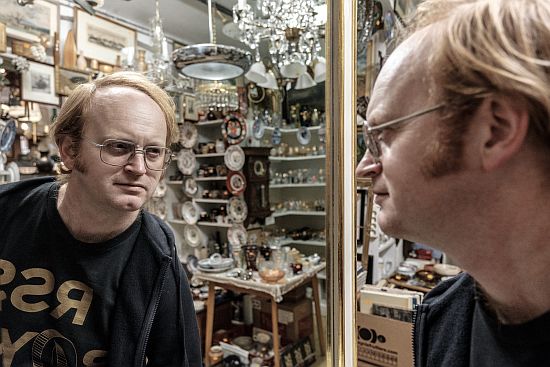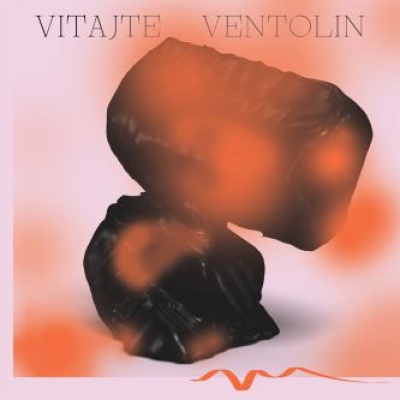By Jan Velinger
September 4, 2018
The inimitable performer talks about the electronic music scene and the success of Disco Science

Seeing eye to eye: Ventolin / Foto: Romana Kovacsova, used with permission.
Students of psychology will know Dr. David Doubek for his work at Charles University; but Doubek is also a producer, actor and key figure on the Czech electronic music scene.
As Ventolin, the musician has a wide following and his second album Vitajte was greeted with critical acclaim.
One track - Disco Science –with a video directed by Midi Lidi’s Petr Marek, became something of a cult hit.
I caught up with Ventolin ahead of the new semester. In our interview, Ventolin talks about everything from minimalism in poetry to his first love in music years ago.
“I started with folk music, which in the Czech Republic is a little bit of an abbreviation also for folk and country music; it was the music that my parents listened to. It began one day when I was ill and I had stayed at home.
“I listened to some old tramping record and suddenly realised this was something that I wanted to do, that I wanted to learn to play the guitar. When I was a kid, I didn’t go to any music school. So this was the only music I knew.
“There was also a social aspect: when you knew guitar, you could play with others around a fire, I mean, a campfire…” (laughs)
In the ‘80s, electronic music really came to the fore: what was the turning point for you?
“There were several such moments in my teenage years, I think. While I listened and played folk with my friends and that was the norm, I also listened to music mostly on cassettes and there were many Czech pop bands that had begun using synthesizers.
“Czech pop that used synthesizers was kind of despised by the folk scene but secretly I think it was a guilty pleasure. We all knew synth bands from the West, including New Wave and Depeche Mode and the new romantics and so on, from cassettes and discotheques even under communism, I liked it. I got a guilty pleasure to listening to electronic music despite belonging normatively to a different camp.
“In my teenage years I then heard a program on Czech Radio called Větrník focusing on rock music and other genres and one day I heard an episode focused solely on industrial music. They featured, for example, Throbbing Gristle, and that completely changed my perspective. I listened in the bathroom in my parent’s house because that was the only room where I could listen to loud music.
“I saw that there were people doing things that were completely different. By that time I was also bored with just the ‘naked’ guitar and this caught my interest.”
How does making music differ when you are using so many different boxes patched together rather than just traditional instruments?
“The first thing is that it was a long journey from playing guitar and folk music. One of the things along the way was just switching to electric guitar and starting to use FX boxes. The beginning was using pedals to change the sound of the strings, with flangers and distortion and so on.
“For many years, I played guitars and bass guitars, drums, and was in a band. In the early 2000s, I made up my mind to use more synths and computers and sequencers as backing for the guitars. That of course is still a common approach.
“Then I had a band which was purely electronic: we only used electronic instruments through AKAI MPCs to play music live without any playback. It was just electronic and it looked like we were playing typewriters, you know?!
“It was funny and at the same time I started this Ventolin project…” (laughs)
You have talked a lot about minimalism. How important is it in your approach?
“Minimalism is very widely-used in electronic music. I can’t say why but I can say why I am attracted to it. I like simplicity and straightforwardness and the opportunity to speak or pass the message directly; I enjoy it aesthetically.
“I used to write poetry and I always preferred when a poem fit on one page than poems that were dozens of pages long. I like the haiku form and when you can see the poem all in one moment and that kind of simplicity is something that electronic music provides.
“One of things that I learned when I began writing poetry was that there is a lot to be gained from silence. If you use only a few words, you can create a space that allows room for freedom of thought, for emotions, and for artistic creation. I like minimalism because of the space it allows you to create.”
Is there an element of your set-up, either live or in the studio, which you can't be without?
“That’s an interesting question and one that I ask myself often: do I really need this? My set up is all based around one central item which the AKAI MPC sequencer and sampler. This is a machine which was essential in creating the Hip Hop genre and techno and many others. I have been using AKAIs for more than 15 years. There were more generations but I use an AKAI MPC 1000 with an alternative operational system. That is the core.
“But if you see the show or listen to the music, you mostly don’t hear the AKAI: instead, you hear synthesisers which are driven by the sequencer. It is hard to say what items are absolutely essential.
“I constantly observe and think about how I could make it even more simple, more performance-oriented, or just change things around. But the AKAI remains as the brain or the core.”
Ventolin is your stage name… a persona with a certain image with which you are obviously comfortable. Who is he?
“Petr Marek of Midi Lidi said about the Ventolin project that what is important is the whole: Ventolin is made up of different parts.
“There is the ‘musician’, who has a kind of funny-looking image, there is the electronic music and the performance that is very driving and has a lot of energy. I don’t try and play ‘the funny guy’. Instead, what I am looking for is to hold a line where I do things that I feel, at a given moment, that are authentic.
“Things may be ‘hilarious’ to someone but authenticity is what is important.
“There are a lot of stereotypes and clichés in music and performance across genres, and one set of them is related to age.
“But what I found is that people are bored by this. They enjoy the fact that you can have someone who looks like they ‘came from another century or something’ to perform. It may be strange or weird… but it works.”

People are attracted to the humour in your lyrics and in your visuals. The video to one of the main tracks on Vitajte, Disco Science, puts you in the Czech countryside, eating sponge cake (bábovka) with a female friend… But the paradox is that half or most of the imagery is fake: we have scenes from the countryside but they are all actually projected behind you via a green screen.
“The video is purposely very amateurish in terms of appearance. But the green screen was great for all kinds of intellectual exercises (laughs).
“Usually green screen is used to create something unreal. But to use it to fake such a readily available reality – that was funny and so weird and that was a fun part of shooting the video for Disco Science. It is really funny to go to such a great effort to render a readily-available reality through a green screen is really weird.”
One aspect, which I got from past interviews, is that you kind of want to knock people off their perch a little bit. Either by surprising them, sometimes making them slightly uncomfortable or making them laugh at themselves…
“Yes, I want people who come to a show to come out of their comfort zones. It’s all about anxiety which is generated through social structures: we all have to be ‘careful’ about how we look, how we present ourselves. This is a very common and natural thing in structured society. But I think music has the power to overcome this.
“Maybe there is this ideal of commonality and that music can bring people together and that is very important for me.
“So all of these elements that I use should work toward this end.
“Maybe you are someone who already feels old. Or somebody who doesn’t feel very nice. Or someone who feels bored. And you come to the concert and you forget everything. That’s part of what I am trying to do.”
Tomáš Frkal's excellent short documentary about Ventolin